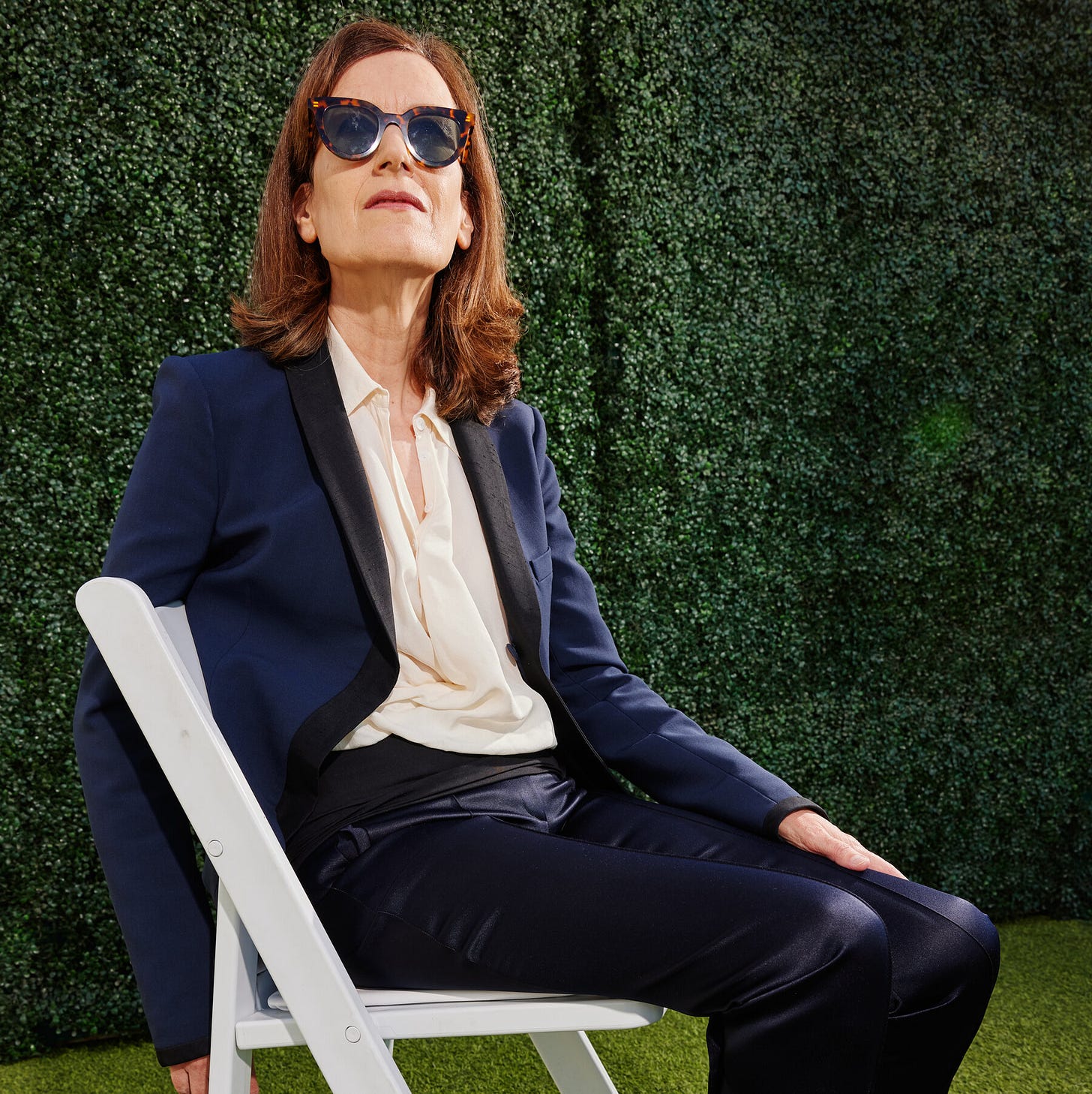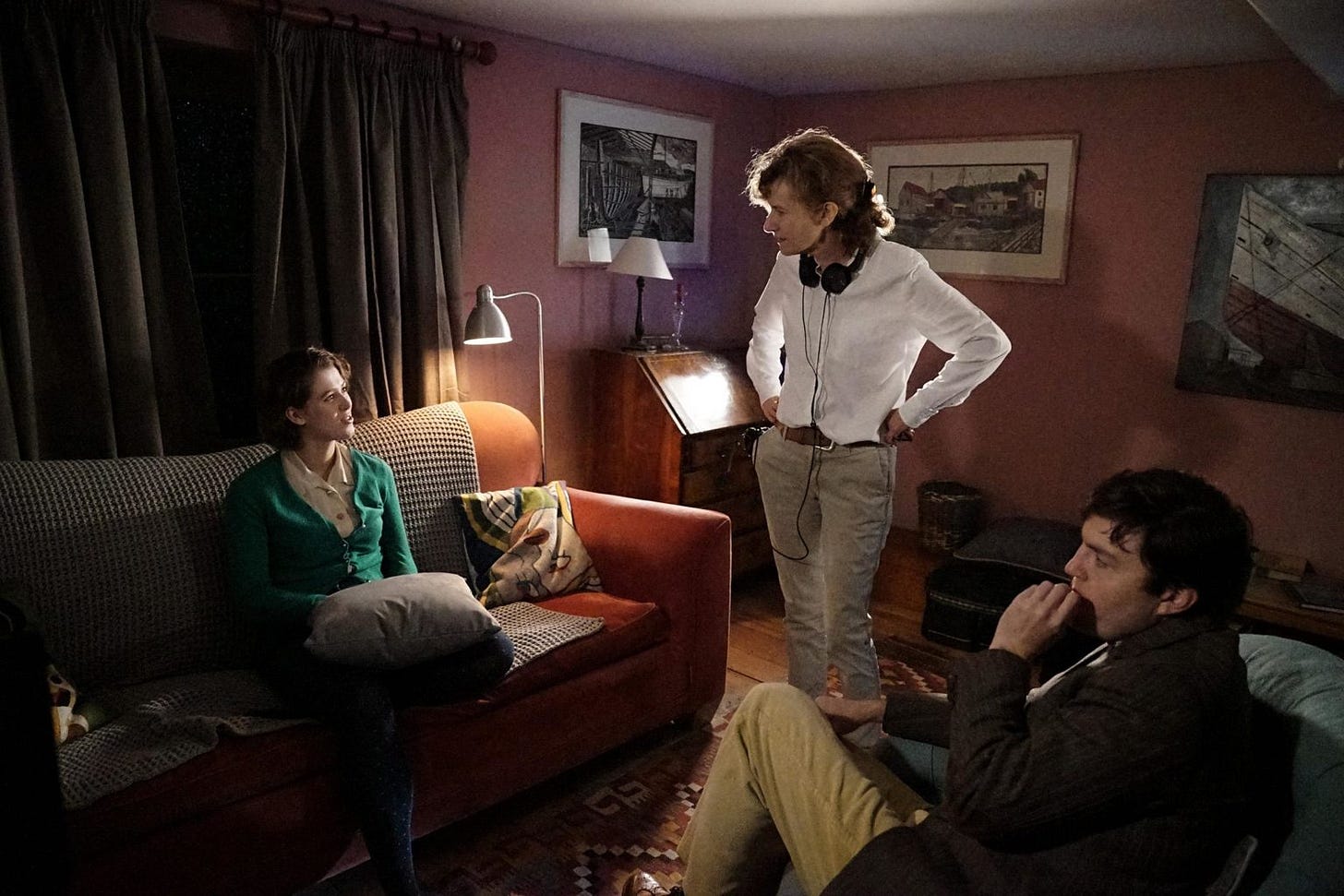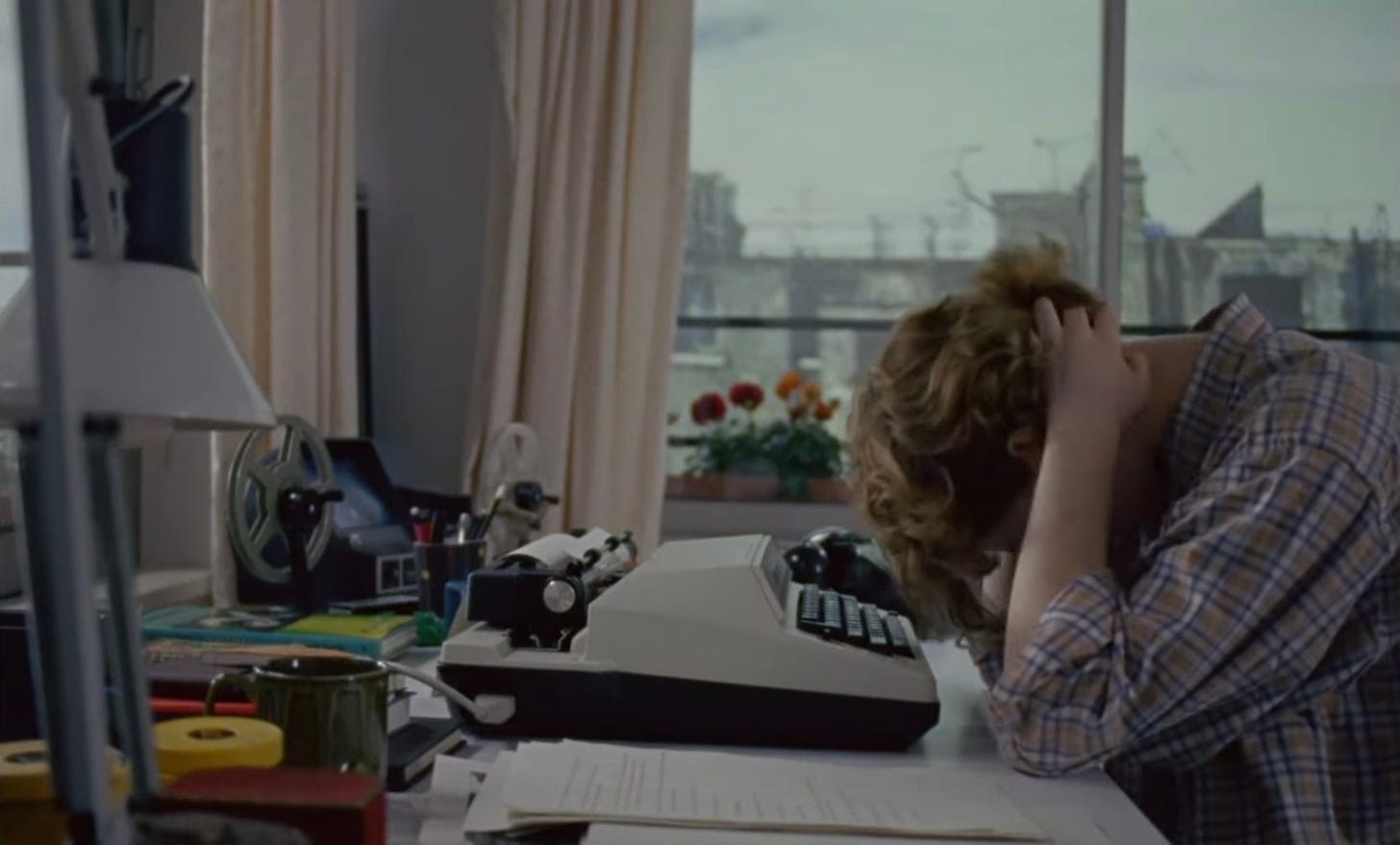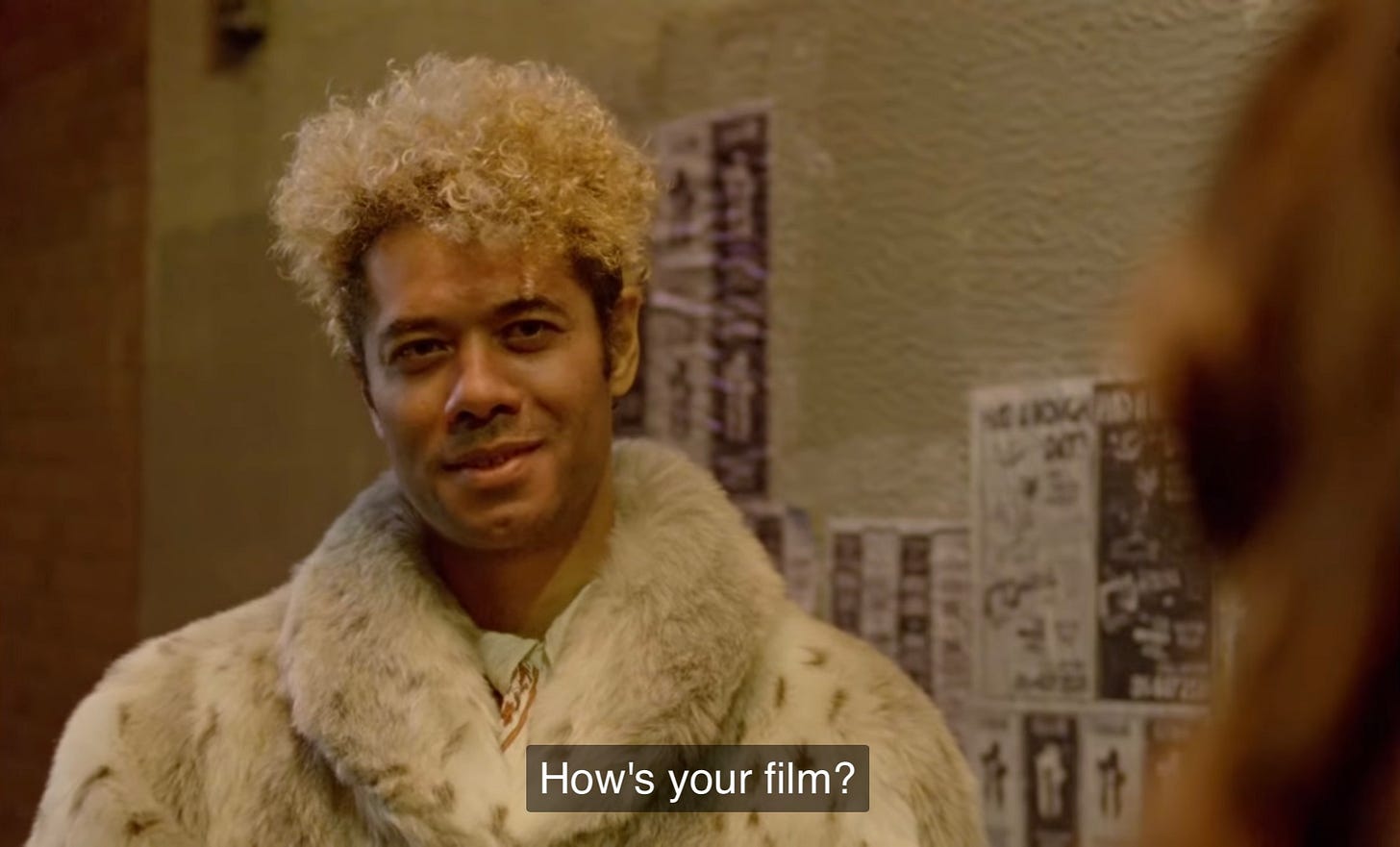Joanna Hogg’s art of perseverance
“You do all the things that are not right, but they all contribute to the thing that will be right in the end.”
Welcome to the latest issue of Subtle Maneuvers. Previously: Mary Ruefle does not own a computer.
Joanna Hogg (b. 1960)
Our society routinely celebrates youthful talent, but, really, aren’t late bloomers a million times more interesting? I certainly feel that way about the British filmmaker Joanna Hogg, who went to film school in the early 1980s but didn’t release her first feature until 2007, when she was 47. Hogg has made an additional four films since then—her latest, The Souvenir Part II, is in theaters now—and I can’t help but feel that it was Hogg’s long years of not making films that enabled her to make these kind of films, which are so much about atmosphere, suggestion, uncertainty, and awkwardness, and which are suffused with a wry sense of the fundamental inexplicability of human relationships.

Watching Hogg’s 2010 film Archipelago last week, I was struck by a speech made by one of its characters that seems almost like a message from Hogg to her younger self, and which I think is a useful reminder for any of us trying to wriggle through by subtle maneuvers. In the scene, the film’s twentysomething protagonist, Edward (Tom Hiddleston), has confessed to a middle-aged painter, Christopher (played by the real-life painter Christopher W. Baker), that he really has no idea what he’s doing with his life. He’s on the verge of leaving to do humanitarian work in Africa, but now he thinks it’s the wrong path. Maybe he should be a writer instead, somehow? Christopher says:
It’s not really what you do, it’s more the intensity by which you do it. By the conviction of your reality that you believe in, you’ll make others believe in it. You kind of can’t make it up, really. And then people get convinced, and even oneself gets convinced. There’s no one hidden track that’s there waiting for you. You’ve just got to step into it, whatever that is. And it takes—one does all sorts of things with painting, you do all the things that are not right, but they all contribute to the thing that will be right in the end. It’s never lost; it’s all accumulating, all building up in intensity. But it’s not secure, is it? It’s just not solid or anchored.
Christopher adds that perhaps Edward needs to “toughen up.” Later he explains what he means:
I guess being tough is actually holding your course in some way and believing that thing inside of you that’s really, really important to you, even though it’s not defined as yet, and you can’t articulate, you can’t reveal it to others in its full worldly sense. But it—it just takes a long time to, in a sense, fully come to that point. For other people it’s quick. But for me it’s taken a long time. Which I’m kind of glad, because it means that I know the angles a bit more.
Though I like to imagine that this is Hogg’s message to her younger self, these are almost certainly not her actual words. Hogg does not write conventional scripts for her films, preferring instead to create a thirty-page narrative that’s more like a short story than a screenplay. When it comes time for filming, she employs long takes, with the camera left running as the characters improvise their way through the scenes described in Hogg’s narrative.
Though Hogg is hardly the first to encourage actors to improvise, her method is particularly open and uncontrolled. She doesn’t just allow serendipity but seems to depend on it. (She has said that she’s interested in “having an idea and not knowing how to realise it.”) This even applies to the casting of her films. I was fascinated and horrified to read that the two leads for her third film, Exhibition—my personal favorite—were not cast until ten days before shooting was scheduled to begin (!). Similarly, it was a chance conversation between Hogg and her old film-school friend Tilda Swinton that led to the casting of Swinton’s daughter, Honor Swinton Byrne, who had never acted before, in the lead role for The Souvenir and its sequel.
These kinds of details fascinate me because, in my own work life, I find the anxiety of things potentially not working out so intense that I’m very careful to avoid putting myself in that position to begin with. But Hogg seems able to endure that anxiety in order to find out the answer to the attendant question: What if things did work out?

“I RESENT THE COMPUTER”
Since everyone seemed to enjoy reading about Mary Ruefle’s computer-free writing life last week, I thought I’d note Joanna Hogg’s similarly unenthusiastic attitude toward contemporary tech. In making The Souvenir, which is set in the 1980s, Hogg drew on her own photographs, Super 8 films, diaries, and keepsakes from that era. When an interviewer mentioned in 2019 that younger filmmakers probably don’t have this same kind of material, since everything in their lives has been digital, Hogg seemed aghast:
What a shame! It should inspire you to be more analog. Respect the object. It’s so nice, the tactility of objects. That was something that we really set out to do: to feel the sensuality and the tactility of that time. How the object is just so important. You don’t have a computer and a mobile phone; you have a typewriter. Having this conversation makes me very nostalgic for that time. I still write in notebooks. I resent the computer, I resent email, and I don’t think it nourishes our lives. . . . I had this crazy idea with The Souvenir that we should make it with no mobile phones, no computers, and no emails, but it’s impossible to do!
ADVICE ON CREATIVE GROWTH
Over the summer, I took part in Substack Grow, a workshop hosted by my newsletter provider about growing one’s writing practice and audience. At the end, Substack asked if I’d take a crack at writing an advice column–style answer to the dilemma of wanting to grow creatively but feeling stuck. So I gave it a shot! Read my advice here.
BOOKMATCH! 🤓 ↔️ 📚
The brilliant minds behind n+1 have dreamed up a brilliant means of fundraising: Donate any amount to the magazine this month and you’ll be granted access to a witty and absurdist online personality quiz, which will match you with ten books perfectly suited to your uniquely damaged psyche. I tried it myself and received a delightful feast of must-reads. Donate and take the quiz here.
THE TEMPTATION TO BE OBVIOUS
One last bit of Joanna Hogg artistic wisdom, via The Souvenir Part II trailer:
Thanks for reading! This newsletter is free, but if you’re feeling generous you can support my work by ordering my Daily Rituals books from Bookshop or (if you must) Amazon.












Love this- thank you
Love Joanna Hogg and love this post! Thank you.